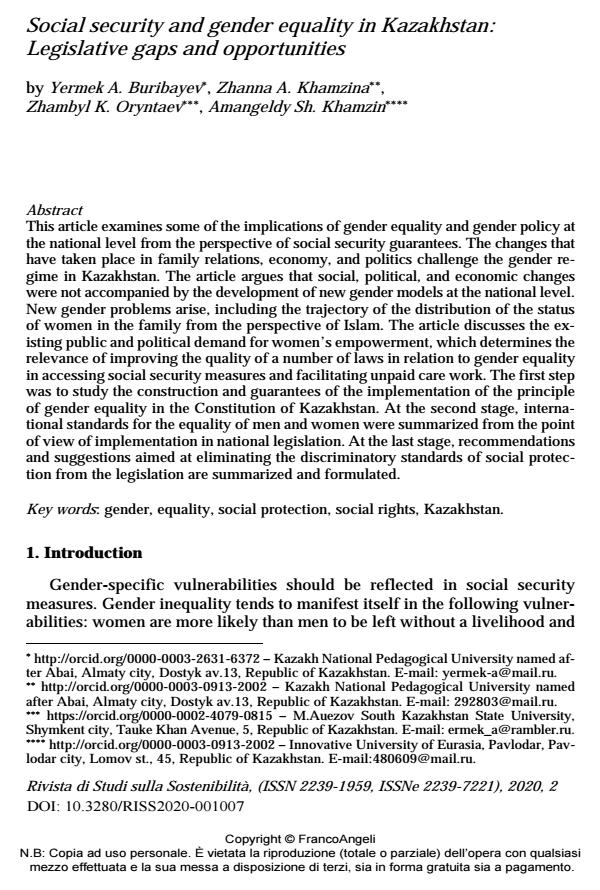Social security and gender equality in Kazakhstan: Legislative gaps and opportunities
Titolo Rivista RIVISTA DI STUDI SULLA SOSTENIBILITA'
Autori/Curatori Yermek A. Buribayev, Zhanna A. Khamzina, Zhambyl K. Oryntaev, Amangeldy Sh. Khamzin
Anno di pubblicazione 2021 Fascicolo 2020/2
Lingua Inglese Numero pagine 22 P. 103-124 Dimensione file 140 KB
DOI 10.3280/RISS2020-002007
Il DOI è il codice a barre della proprietà intellettuale: per saperne di più
clicca qui
Qui sotto puoi vedere in anteprima la prima pagina di questo articolo.
Se questo articolo ti interessa, lo puoi acquistare (e scaricare in formato pdf) seguendo le facili indicazioni per acquistare il download credit. Acquista Download Credits per scaricare questo Articolo in formato PDF

FrancoAngeli è membro della Publishers International Linking Association, Inc (PILA), associazione indipendente e non profit per facilitare (attraverso i servizi tecnologici implementati da CrossRef.org) l’accesso degli studiosi ai contenuti digitali nelle pubblicazioni professionali e scientifiche.
This article examines some of the implications of gender equality and gender policy at the national level from the perspective of social security guarantees. The changes that have taken place in family relations, economy, and politics challenge the gender regime in Kazakhstan. The article argues that social, political, and economic changes were not accompanied by the development of new gender models at the national level. New gender problems arise, including the trajectory of the distribution of the status of women in the family from the perspective of Islam. The article discusses the existing public and political demand for women’s empowerment, which determines the relevance of improving the quality of a number of laws in relation to gender equality in accessing social security measures and facilitating unpaid care work. The first step was to study the construction and guarantees of the implementation of the principle of gender equality in the Constitution of Kazakhstan. At the second stage, international standards for the equality of men and women were summarized from the point of view of implementation in national legislation. At the last stage, recommendations and suggestions aimed at eliminating the discriminatory standards of social protection from the legislation are summarized and formulated.
Parole chiave:Gender, equality, social protection, social rights, Kazakhstan.
Yermek A. Buribayev, Zhanna A. Khamzina, Zhambyl K. Oryntaev, Amangeldy Sh. Khamzin, Social security and gender equality in Kazakhstan: Legislative gaps and opportunities in "RIVISTA DI STUDI SULLA SOSTENIBILITA'" 2/2020, pp 103-124, DOI: 10.3280/RISS2020-002007